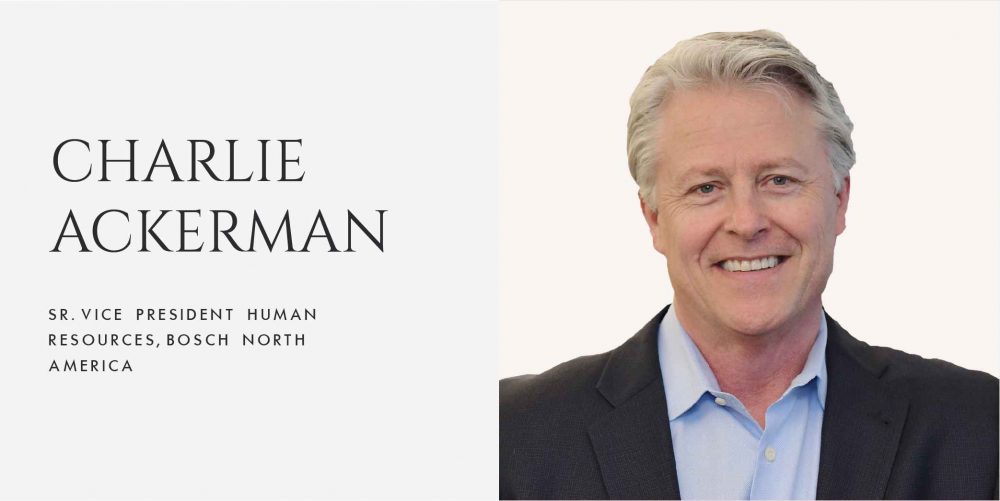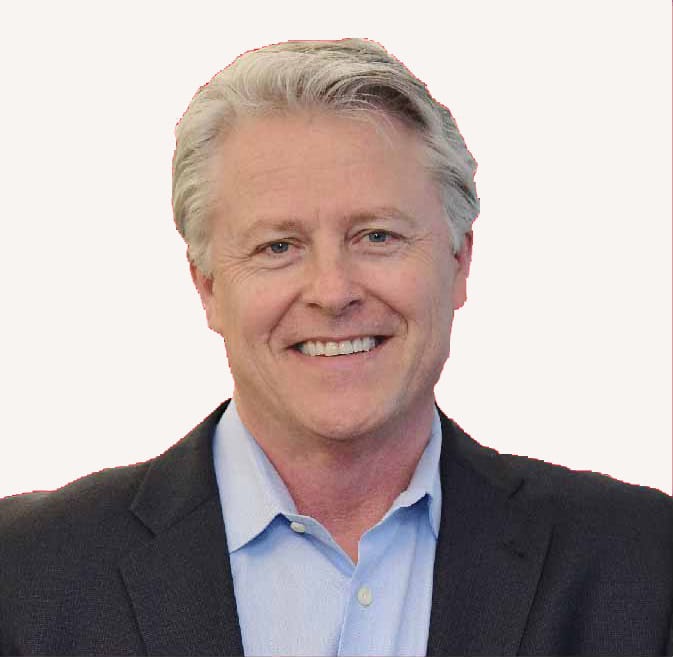Is paycheck the decisive factor in determining whether employees feel their work is worthwhile? And if not, what are the ways and means of creating a culture where employees are united by curiosity, knowledge, innovation and a shared sense of purpose? We’ve had the opportunity to interview Charlie Ackerman who provided some illuminating insights on how Bosch is equipped to drive change in its workforce, and what lessons have been reinforced over the past year to help the innovation engine become future ready.

The HR Digest: What is Bosch’s secret sauce to being recognized as one of the “Best Workplaces for Innovators?”
Charlie Ackerman: The drive to constantly search for answers is a fundamentally important part of Bosch, one that has been part of the company’s DNA for over 135 years. Bosch firmly believes that research is not an end in itself —a never-ending race to develop new technologies —but rather something that makes a tangible contribution to improving the quality of people’s lives. That belief is reflected in the words “Invented for life,” which is not only our claim but our strategic imperative.
That spirit of innovation manifests itself in many ways throughout the organization. For example, Bosch recently introduced the Virtual Visor product, which helps improve safety for drivers by using a driver-facing camera and a smart flip-down LCD to digitally block sun glare. The idea for this product came from creative brainstorming by two Bosch associates, who secured leadership support to bring their idea to life. We encourage our associates to step outside the box and push the limits of creativity on a daily basis. In fact, we have created internal platforms to enable our associates to innovate every day with colleagues from around the world.
Bosch takes great pride in its Business Resource Groups (BRGs). Can you tell our readers more about these programs and how they promote change within the company in practical terms?
At Bosch, Business Resource Groups (BRGs) are designed to engage our associates in important conversations about critical topics. Our BRGs are voluntary and are typically developed by associates who want to drive and influence our workplace culture. These outlets provide an opportunity for all associates to raise their voices within the company, and support our dedication to foster an inclusive, respectful, and positive environment.
Our BRG program is a platform for connecting and learning from each other, which is vitally important for an organization such as Bosch with so many diverse associates. These groups build common ground and provide associates with the tools they need to continue to grow personally and professionally. Simultaneously, BRGs are empowered to advise Bosch leadership on policies and practices that support associates, emphasize the issues we have in common, and advocate for awareness and inclusion.
One of our newest BRGs is BeAdept. The goal of this group is to bring awareness, resources, and support to those impacted by a disability. For example, the group helps colleagues to better understand the challenges faced by those affected by disability and how to provide support.
What is the number one leadership competency required in today’s fast-paced, unpredictable world?
Adaptability has always been a critical key to success, but if the Covid-19 pandemic has taught us anything, it’s that adaptability has become more important than ever. The past two years have seen more dramatic changes in the workplace than at almost any time in modern history. This has required all of us, especially HR leaders, to learn to lead in the “new norm” of remote working, flexible schedules, and with a greater emphasis on employee health and safety.
Our new virtual office environment has also placed a new emphasis on the need to foster strong relationships with subordinates and peers. Without the traditional opportunities to interact with our teams in-person, we’ve had to learn to adapt in many ways, such as adopting video communication tools, virtual whiteboards for innovation, and the like. We’ve also had to learn to make an even more concerted effort to preserve our culture of innovation through internal collaboration. It takes a new level of understanding and bridge-building to navigate any organization through such unchartered waters.
That enhanced level of adaptability applies across the entire value chain to the customer, from a horizontal, vertical and diagonal perspective. The pandemic hasn’t diminished market demand for continuous innovation, but it also presented the opportunity for Bosch to re-evaluate how we build strong relationships and collaborations in an ever-evolving world.
What do you think most boards misunderstand or underestimate about human resources?
Most boards underestimate the concept of change management and the science behind human behavioral change. There’s a process by which HR professionals identify behaviors that lead to a high-performance culture and link those behaviors to key performance metrics. That process, and the results created by going through that process, can be difficult to quantify for board members.
It’s also often difficult to convince boards to embrace the need for uplifting and inspiring messages from leaders. Leadership positivity leads to organizational positivity, and helps build a company culture based on collaboration, mutual support, creativity and maximum effort.
Boards sometimes don’t recognize that culture can be reinforced by effective role modeling and mentoring on the part of an organization’s leaders. For example, it’s important for thought leaders and key skills experts to share expressions of gratitude with their supporting teams, in both times of success and when times are tough. The notion of working simply for a paycheck are long gone. People typically stay motivated to perform and achieve when their efforts are appreciated by their leaders.
In addition, it’s important to reward leaders who excel in change management, leadership positivity and role modeling, but that is also often overlooked or misunderstood at the board level. In order for a positive, collaborative culture of performance to exist within an organization, the concepts of open communication, positivity and gratitude must permeate the organization at every level, and examples are best set at the top.
What is the key lesson you want aspiring CHROs to take away from your work?
I’ve always sought the truth through data, and I’ve always shared that truth throughout our organization. I would encourage any aspiring HR professional to embrace data and not be afraid of it. Why? Because data doesn’t lie, and transparency is your friend. Data can be used to overcome challenges at every level of an organization, so it should be shared far and wide.
In fact, I believe HR pros should be positively nerdy about data, and they should use data as an enabler for continuous improvement. It translates easily at the board level, it quantifies the effects of any implemented changes, and it can be used to predict the need for additional action in the future.
It’s important for CHROs to leverage data analytics to illustrate positive and negative shifts in sales and EBIT contribution. This will help continue to dispel the perception that HR is a cost center or soft skill-based function and demonstrate how data-driven HR can directly impact the bottom line.
How are you going to shake things up next?
I dream about improving the workforce development eco-system at the state level, in states where Bosch has significant investment. We all know that talent scarcity will continue to be a challenge for us for the next 10 years or more, especially due to rapid technological advancements in many of the markets we serve. One big key to tackling that issue is by building a better workforce development model between industry, government and our educational system. This is a personal passion of mine, but I also have a great team in place that is working to inspire this passion across our entire organization.
Bosch has been very active in supporting STEM education for many years, but there’s more to be done at many levels. For too long, we’ve been asking, “Why is the current educational system not providing enough STEM talent from secondary and post-secondary educational institutions?” There are many answers to that question, but I believe one significant solution is for states and school systems to work together more closely with companies like Bosch to make sure a workforce strong in STEM skills is being consistently produced.
Because I’m a bridge builder, I’d like to build a better model between industry, government and education to help solve our talent pipeline issues, and to offer more opportunities to people in the communities in which Bosch operates. I believe such a model is achievable, perhaps through direct engagement with local school districts to help build school curricula, or through apprenticeship programs similar to those in Germany. But the first step is for all sides to come together and work collaboratively as we’ve never done before, and to me, that would shake things up for all the right reasons.
 |
Charlie Ackerman, Charlie Ackerman is Senior Vice President of Human Resources for Bosch in North America, and has served in that role since 2008. Charlie is a globally networked executive with extensive HR, manufacturing, and international experience. Based in the metro-Detroit area, Charlie is responsible for preparing, shaping and leading the human capital strategies that enable business growth, including engagement of Bosch’s more than 35,000 associates across the U.S., Mexico and Canada. Charlie thrives on developing and implementing strategies that accelerate a culture of high performance. Photo: Bosch North America |
This profile was published in the January 2022 issue of The HR Digest.





